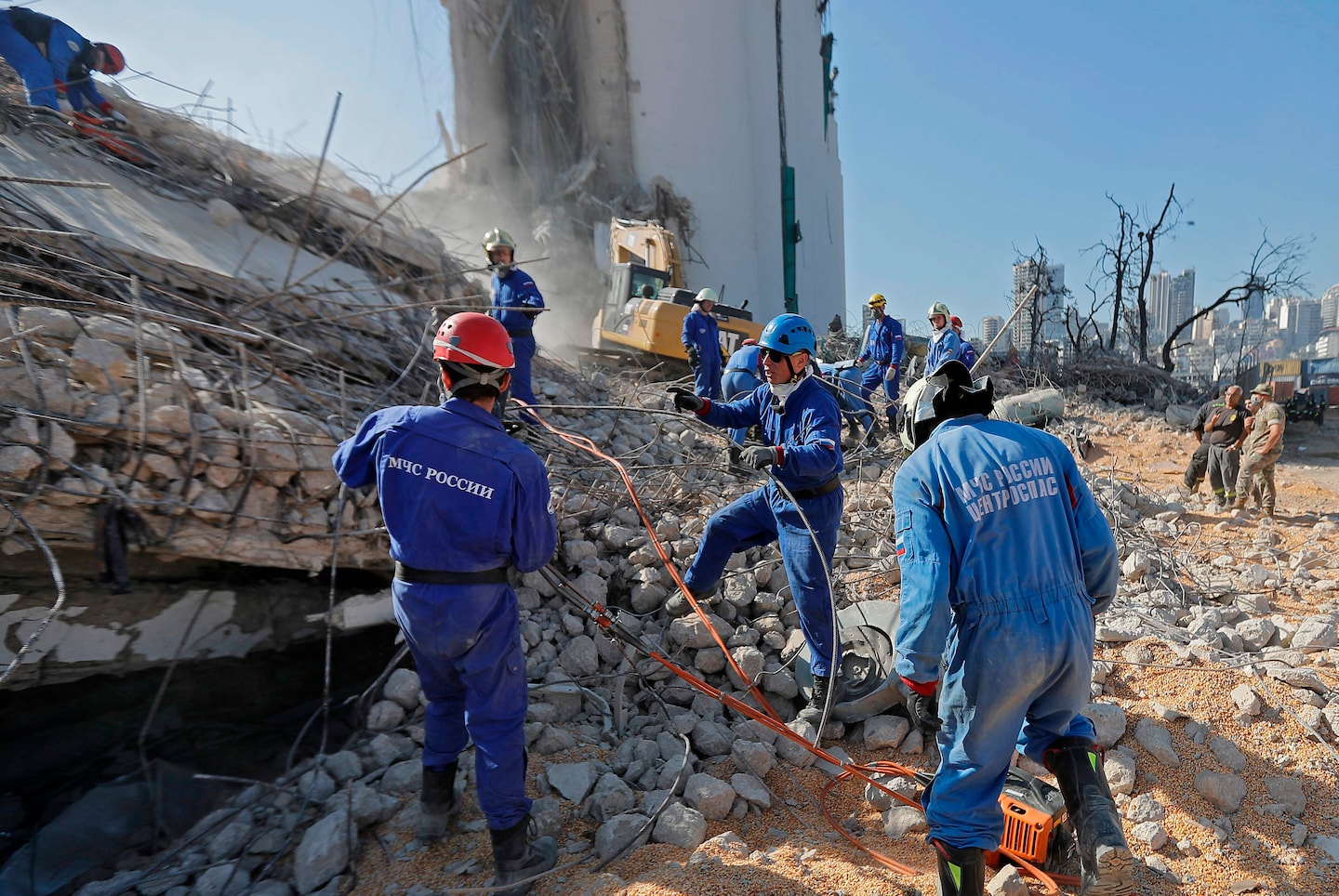Beirut death toll tops 150; Hezbollah leader warns against blaming Shiite militia amid political fallout

Lebanese President Michel Aoun told local media Friday that an investigation was examining both negligence and “external interference” as potential causes of an initial fire that ignited the explosions.
Later in the day, he rejected calls for an international probe into the cause of the explosions, saying it would “delay the truth,” while hitting back at any suggestion that he bore responsibility or was out of touch with the Lebanese people. “I know every house, and they know me,” he told reporters. “They know I will not stop short of taking responsibility or defending my country, which is my people.”
But on Beirut’s streets and inside what is left of its houses, anger is growing. As Beirut’s cleanup continued — led by citizens, not the government — a ragged protest group marched down the once-vibrant thoroughfare of Gemmayze, passing the rubble that had been people’s homes. “The people demand the fall of the regime,” they chanted.
French and Russian rescue teams, including 22 French investigators, were assisting in search and relief efforts and evidence recovery, Lebanese media reported Friday. In the morning, civil defense workers discovered the body of Joseph Akiki — an electrician at the port complex — just hours after his mother appeared on television to plead for her son’s return. Her interview was circulated widely online as angry Beirut residents seethed at the government, which they said was responsible for the devastation, and clashed with security forces overnight.
“I will keep on waiting because I know that Joe Akiki is strong, Joe Akiki is a hero. Joe Akiki has been through worse things and has been able, with the help of God, to overcome them. To overcome everything,” she told Lebanon’s MTV.
The U.S. Embassy in Beirut said Friday that the United States has pledged more than $17 million in initial disaster aid for Lebanon, including food, medical supplies and financial assistance for the Lebanese Red Cross.
On Thursday, a C-17 U.S. military transport aircraft landed in Beirut carrying the first tranche of emergency assistance, the statement said. Two more flights were scheduled to arrive Friday, carrying meals, water and medical kits for the Lebanese armed forces.
Lebanese authorities appeared to take halting steps toward accountability for the explosions, detaining ports and customs officials and freezing the bank accounts of several officials, including the port’s general manager, Hassan Koraytem, and customs chief Badri Daher. On Friday, investigators led by a military judge were set to interview Koraytem and former public works minister Ghazi Aridi, the Associated Press reported.
The ammonium nitrate, a highly volatile material used in fertilizer, can also be used to make bombs. It was stored at a warehouse at the port for about six years despite repeated warnings about the risk it posed. The chemical stockpile was impounded from a Russian-owned ship that docked in Beirut in 2013 on its way to an explosives company in Mozambique.
The Russian captain of the ship, Boris Prokoshev, said in an interview with the AP that he was shocked by the news.
“It’s very bad that people died; they had nothing to do with it,” he said from his home south of Moscow, the AP reported. “I realized that it’s the government of Lebanon that brought about this situation.”
The cause of an initial fire that ignited the ammonium nitrate remains unclear. Aoun said Friday that he has asked French President Emmanuel Macron for aerial images of the blast site.
The fury in Beirut spilled out during a visit to Lebanon by Macron, who toured the destruction Thursday, followed by a crowd that demanded that any emergency aid bypass corrupt government officials. By nightfall, after a day of funerals, protesters in central Beirut were calling for a “revolution” while trying to breach the parliament building.
People on the streets and online demanded even more dramatic action. Some have called for executions — a demand that, in the current environment, appears only partly hyperbolic and marks a shift from the mainly peaceful chants that have previously characterized Lebanon’s protests against the entrenched political system and its history of corruption.
“They keep talking about hanging the politicians,” one young Lebanese psychologist said in a WhatsApp group with her friends. “I’m down to build gallows and put their names on them.”
Macron, the first world leader to travel to Lebanon after the explosions, called for international experts to be included in any investigation. His visit, at times, made for a bizarre spectacle, with some of those crowding around him calling for France to revive its former colonial role in Lebanon and restore the French mandate.
Angry crowds surrounded Macron as he toured destruction in East Beirut’s historic quarter, and they warned of any plan to deliver French aid to Lebanon’s leaders without accounting for how it was spent. “How do you know if you give money to them, they won’t steal it?” one man shouted at him, referring to Lebanon’s political class.
“You’re protecting thugs,” another said as Macron pleaded with the crowd.
“Do you trust me?” he said, according to footage broadcast on Lebanese television. At one point, Macron was shown hugging a woman affected by the blast.
“I want this aid to directly reach the Lebanese people,” he continued. “We all felt the pain when the port exploded.”
Macron called for a transparent audit of Lebanon’s central bank and other financial institutions. The moves, he said, would allow the smooth delivery of aid as Lebanon seeks to rebuild.
Beirut’s governor, Marwan Abboud, said damage from the blast is estimated at $10 billion to $15 billion — an amount that Lebanon, already mired in financial ruin, is incapable of mobilizing on its own.
Other countries have rushed to offer assistance, with planes bearing humanitarian aid and medical teams landing or due to arrive from Turkey, Qatar, Kuwait, Egypt, France, Iran and Britain, among others.
Cunningham reported from Istanbul. Loveluck reported from Baghdad.






